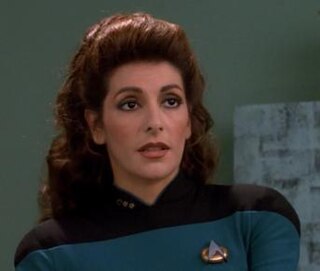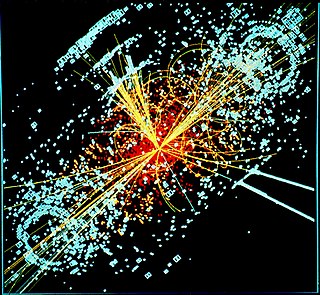Faster-than-light communications and travel are the conjectural propagation of information or matter faster than the speed of light.

Star Trek Generations is a 1994 American science fiction film and the seventh film in the Star Trek film series. Malcolm McDowell joins cast members from the 1960s television show Star Trek and the 1987 spin-off The Next Generation, including William Shatner and Patrick Stewart. In the film, Captain Jean-Luc Picard of the USS Enterprise-D joins forces with Captain James T. Kirk to stop the villain Tolian Soran from destroying a planetary system in his attempt to return to an extra-dimensional realm known as the Nexus.
Star Trek: Voyager is an American science fiction television series created by Rick Berman, Michael Piller, and Jeri Taylor. It originally aired from January 1995 to May 2001 on UPN, lasting for 172 episodes over seven seasons. The fifth series in the Star Trek franchise, it served as the fourth sequel to Star Trek: The Original Series. Set in the 24th century, when Earth is part of a United Federation of Planets, it follows the adventures of the Starfleet vessel USS Voyager as it attempts to return home after being stranded in the Delta Quadrant on the far side of the Milky Way galaxy.

Deanna Troi is a main character in the science-fiction television series Star Trek: The Next Generation and related TV series and films, portrayed by actress Marina Sirtis. Troi is half-human, half-Betazoid and has the psionic ability to sense emotions. She serves as the ship's counselor on USS Enterprise-D. Throughout most of the series, she holds the rank of lieutenant commander. In the seventh season, Troi takes the bridge officer's examination and is promoted to the rank of commander, but continues as counselor.
Modified AMI codes are a digital telecommunications technique to maintain system synchronization. Alternate mark inversion (AMI) line codes are modified by deliberate insertion of bipolar violations. There are several types of modified AMI codes, used in various T-carrier and E-carrier systems.
The Star Trek fictional universe contains a variety of weapons, ranging from missiles to melee. The Star Trek franchise consists primarily of several multi-season television shows and a dozen movies, as well as various video games and inspired merchandise. Many aspects of the fictional universe impact modern popular culture, especially the lingo and the idea of a spacecraft launching space torpedoes and firing lasers, and have had a wide influence in the late 20th to early 21st century. Star Trek is popular enough that its science fiction concepts have even been studied by real scientists, and NASA described its science in relation to the real world as "entertaining combination of real science, imaginary science gathered from lots of earlier stories, and stuff the writers make up week-by-week to give each new episode novelty." For example, NASA noted that the Star Trek "phasers" were a fictional extrapolation of real-life lasers, and compared them to real-life microwave based weapons that have a stunning effect.

Data is a character in the fictional Star Trek franchise. He appears in the television series Star Trek: The Next Generation (TNG) and Star Trek: Picard; and the feature films Star Trek Generations (1994), Star Trek: First Contact (1996), Star Trek: Insurrection (1998), and Star Trek: Nemesis (2002). Data is portrayed by actor Brent Spiner.
In physics, charge conjugation is a transformation that switches all particles with their corresponding antiparticles, thus changing the sign of all charges: not only electric charge but also the charges relevant to other forces. The term C-symmetry is an abbreviation of the phrase "charge conjugation symmetry", and is used in discussions of the symmetry of physical laws under charge-conjugation. Other important discrete symmetries are P-symmetry (parity) and T-symmetry.

Asymmetry is the absence of, or a violation of, symmetry. Symmetry is an important property of both physical and abstract systems and it may be displayed in precise terms or in more aesthetic terms. The absence of or violation of symmetry that are either expected or desired can have important consequences for a system.
"The Enemy" is the seventh episode of the third season of the syndicated American science fiction television series Star Trek: The Next Generation, the 55th episode overall, first broadcast on November 6, 1989.
A bipolar violation, bipolarity violation, or BPV, is a violation of the bipolar encoding rules where two pulses of the same polarity occur without an intervening pulse of the opposite polarity. This indicates an error in the transmission of the signal.
"All Good Things..." is the series finale of the syndicated American science fiction television series Star Trek: The Next Generation. It comprises the 25th and 26th episodes of the seventh season and is the 177th and 178th episodes of the series overall. The title is derived from the expression "All good things must come to an end", a phrase used by the character Q during the episode itself.
Shuttlecraft are fictional vehicles in the Star Trek science fiction franchise built for short trips in space, such as between a planetary surface and orbit. Also referred to as shuttles, their introduction preceded the development of the Space Shuttle.
"Schisms" is the 131st episode of the American science fiction television series Star Trek: The Next Generation and the fifth of the sixth season. It was originally aired on October 19, 1992.
"Thine Own Self" is the 168th episode of the American science fiction television series Star Trek: The Next Generation, and the 16th episode of the seventh season.
"Who Watches the Watchers" is the fourth episode of the third season of the American science fiction television series Star Trek: The Next Generation, the 52nd episode overall, first broadcast on October 16, 1989.
"A Matter of Perspective" is the 14th episode of the third season of the American syndicated science fiction television series Star Trek: The Next Generation (TNG), and the 62nd episode of the series overall. It was inspired by Akira Kurosawa's 1950 film Rashomon. The 45-minute episode was broadcast on February 12, 1990 on television. It was written by Ed Zuckerman.

In particle physics, CP violation is a violation of CP-symmetry : the combination of C-symmetry and P-symmetry. CP-symmetry states that the laws of physics should be the same if a particle is interchanged with its antiparticle while its spatial coordinates are inverted. The discovery of CP violation in 1964 in the decays of neutral kaons resulted in the Nobel Prize in Physics in 1980 for its discoverers James Cronin and Val Fitch.

Modern searches for Lorentz violation are scientific studies that look for deviations from Lorentz invariance or symmetry, a set of fundamental frameworks that underpin modern science and fundamental physics in particular. These studies try to determine whether violations or exceptions might exist for well-known physical laws such as special relativity and CPT symmetry, as predicted by some variations of quantum gravity, string theory, and some alternatives to general relativity.





